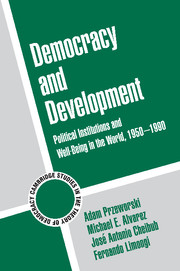
-
Select format
-
- Publisher:
- Cambridge University Press
- Publication date:
- 05 June 2012
- 28 August 2000
- ISBN:
- 9780511804946
- 9780521790321
- 9780521793797
- Dimensions:
- (228 x 152 mm)
- Weight & Pages:
- 0.577kg, 340 Pages
- Dimensions:
- (228 x 152 mm)
- Weight & Pages:
- 0.457kg, 340 Pages
You may already have access via personal or institutional login
Book description
Is economic development conducive to political democracy? Does democracy foster or hinder material welfare? These two questions are examined by looking at the experience of 135 countries between 1950 and 1990. Descriptive information, statistical analyses, and historical narratives are interwoven to gain an understanding of the dynamic of political regimes and their impact on economic development and other aspects of material welfare. The findings, several most surprising, dispel any notion of a trade-off between democracy and development. Economic development does not generate democracies but democracies are much more likely to survive in wealthy societies. Political regimes have no impact on the growth of total national incomes, while political instability affects growth only in dictatorships. Per capita incomes grow faster in democracies since population increases faster under dictatorships. In general, political regimes have more of an effect on demography than on economics.
Reviews
‘There is a lot to be learned from this excellent piece of research …’.
Source: Western European Politics
Contents
Metrics
Altmetric attention score
Full text views
Full text views help Loading metrics...
Loading metrics...
* Views captured on Cambridge Core between #date#. This data will be updated every 24 hours.
Usage data cannot currently be displayed.
Accessibility standard: Unknown
Why this information is here
This section outlines the accessibility features of this content - including support for screen readers, full keyboard navigation and high-contrast display options. This may not be relevant for you.
Accessibility Information
Accessibility compliance for the PDF of this book is currently unknown and may be updated in the future.


